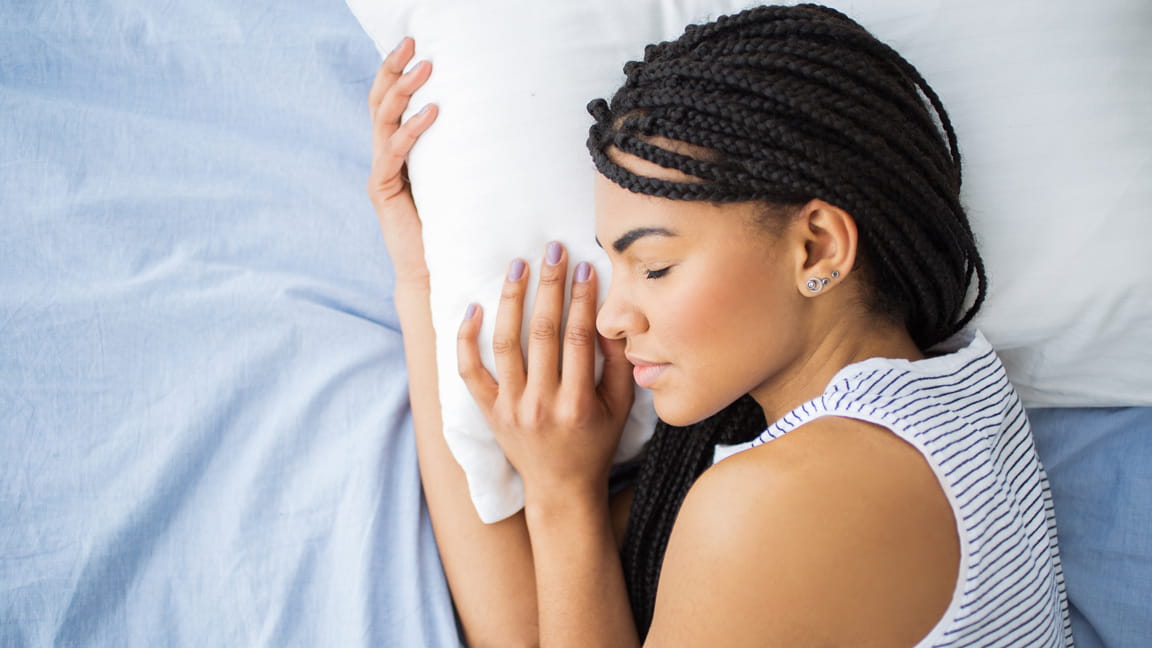How to Sleep Better with a Bedtime Routine

Scheduling the Sandman
Sleeping is something you’ve done all your life, but the older you get, the harder it can be to sleep like a baby. Busy schedules, the stresses of work or school, and a hundred other distractions can keep you wide awake.
There are steps you can take to put yourself in the best state of mind for 7-9 hours of deep sleep. Here are some ways to plan your bedtime routine so you wake up feeling well rested and ready for the next day.
First, set an alarm.
Not to wake up, but to go to sleep. Even for adults, the best sleep requires a set bedtime.1 It’s easy to forget about the clock while streaming another episode of your favorite show, so set a nighttime alarm as a reminder. But don’t hit the sack right away when the bell tolls --leave some time for your routine.
Spend 15 minutes to prep for tomorrow.
A restless mind is not a restful mind. Dwelling on the minutiae of the morning could keep you awake.2 Knock out a few chores the night before.
And don’t forget to make a to-do list. There are tasks you need to complete, and you’re afraid you’ll forget about them by morning. Jotting down a to-do list gets it off your mind and planned so you can rest easy.3 If your list gets you stressed there are ways to take care of yourself.
Next, address that stress.
Practicing mindfulness has proven to reduce anxiety, improve sleep quality and can even help with insomnia.4 Meditation puts you in the perfect mindset to drift off to dreamland. There are many videos available in apps or online.
Journaling is another simple way to quiet your mind by getting your thoughts and feelings down on paper.5 Go analog and get yourself an inspiring journal to write in to avoid all the distractions on your computer.
Finally, wind down to drift off.
Reading before bed is an excellent way to relax the brain and fall asleep. It can cut stress levels in half in about six minutes.6 A good work of fiction can take you out of the real world and into the realm of imagination -- wouldn’t you rather focus on an epic battle between made-up kings than the epic battle you might have getting your toddler ready in the morning? And try a real book made of paper. (Remember those?)
Avoid bright screens at bedtime. The bright light of a TV, computer or smartphone can affect your sleep patterns and keep you alert when you should be getting sleepy.7 Leave the electronics and social media behind (the political rantings of your crazy uncle aren’t going to help you relax, anyway).
If you still can’t get to sleep...
Don’t lie in bed tossing and turning if you’re restless. It’s better to get up and reset. Try some of the activities above for a short time before getting back to bed.8 Ten minutes of meditation or reading might save you hours of staring at the ceiling.
Why wait? Have a better bedtime tonight!
Pick one activity above and commit to adding it to your bedtime routine tonight. Next week, try adding another. Soon, you’ll be a pillow-time pro!
Hit the hay the right way, so you can be Healthy For Good.
Last Reviewed 05/2018
Sources:
1 Soehner AM, Kennedy KS, Monk TH. Circadian Preference and Sleep-Wake Regularity: Associations With Self-Report Sleep Parameters in Daytime-Working Adults. Chronobiology international. 2011;28(9):802-809.
2 Carciofo R, Du F, Song N, Zhang K. Mind Wandering, Sleep Quality, Affect and Chronotype: An Exploratory Study. PLoS ONE. 2014;9(3):e91285.
3 Scullin MK, Krueger ML, Ballard HK, Pruett N, Bliwise DL. The effects of bedtime writing on difficulty falling asleep: A polysomnographic study comparing to-do lists and completed activity lists. J Exp Psychol Gen. 2018 Jan;147(1):139-146.
4 Black DS, O’Reilly GA, Olmstead R, Breen EC, Irwin MR. Mindfulness Meditation and Improvement in Sleep Quality and Daytime Impairment Among Older Adults with Sleep Disturbances: A Randomized Clinical Trial. JAMA Intern Med. 2015;175(4):494–501.
5 Digdon N, Koble A. Effects of Constructive Worry, Imagery Distraction, and Gratitude Interventions on Sleep Quality: A Pilot Trial. Applied Psychology: Health and Well‐Being 2011, 3:193-206.
6 Reading 'can help reduce stress'. The Telegraph. 30 March 2009.
7 Christensen MA, Bettencourt L, Kaye L, et al. Direct Measurements of Smartphone Screen-Time: Relationships with Demographics and Sleep. PLoS ONE. 2016;11(11):e0165331.
8 Insomnia: What to Do When You Can’t Sleep. Sleepfoundation.org. Accessed 9 May 2018.








